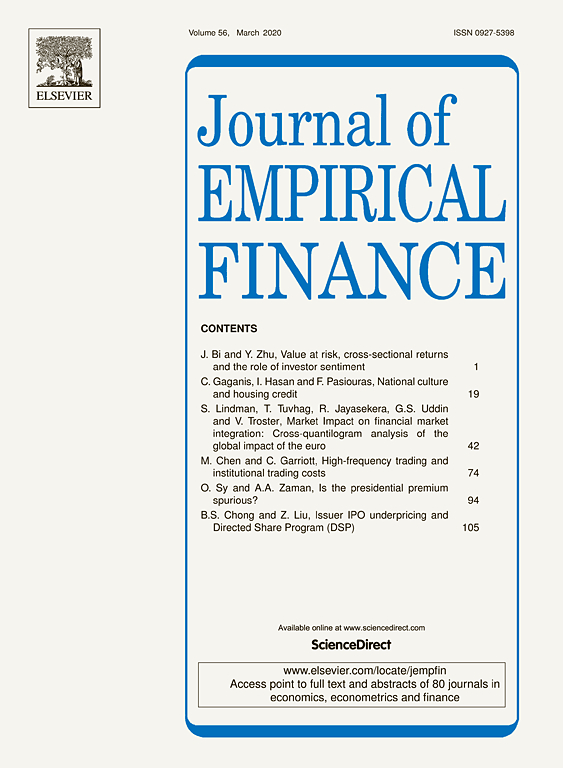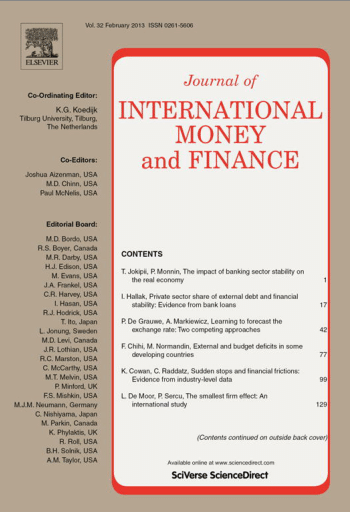Financial System Adaptability and Resilience
This research group investigates critical aspects of financial system adaptability and resilience. First, it analyses the impact of natural disasters on financial systems. Second, the group aims to investigate the effects of political preferences for the green transition. Third, the group's research analyses the role of culture in economies.
Research Cluster
Financial Resilience and RegulationYour contact

- Department Financial Markets
EXTERNAL FUNDING
08.2022 ‐ 07.2025
OVERHANG: Debt overhang and green investments - the role of banks in climate-friendly management of emission-intensive fixed assets
The collaborative project “Debt Overhang and Green Investments” (OVERHANG) aims to investigate the role of banks in the climate-friendly management of emission-intensive fixed assets. This will identify policy-relevant insights on financial regulation, government-controlled lending and financial stability, as well as raise awareness among indebted stakeholders.
01.2015 ‐ 12.2019
Interactions between Bank-specific Risk and Macroeconomic Performance
07.2016 ‐ 12.2018
Relationship Lenders and Unorthodox Monetary Policy: Investment, Employment, and Resource Reallocation Effects
We combine a number of unique and proprietary data sources to measure the impact of relationship lenders and unconventional monetary policy during and after the European sovereign debt crisis on the real economy. Establishing systematic links between different research data centers (Forschungsdatenzentren, FDZ) and central banks with detailed micro-level information on both financial and real activity is the stand-alone proposition of our proposal. The main objective is to permit the identification of causal effects, or their absence, regarding which policies were conducive to mitigate financial shocks and stimulate real economic activities, such as employment, investment, or the closure of plants.
Refereed Publications

Income, Trading, and Performance: Evidence from Retail Investors
in: Journal of Empirical Finance, March 2022
Abstract
We examine whether household income influences the trading styles of retail investors and their investment performance. To investigate this question, we use a unique dataset of branch-level trading that contains all retail investors and observe that those investors with high income trade more and earn significantly higher returns in the stock market. In addition, this income effect becomes stronger for highly risky stocks, such as gambling or lottery-like stocks. These findings are in line with the information model theorized by Peress (2004) in which wealthy investors take extra risks by trading more stocks.

Banking Reform, Risk-Taking, and Accounting Quality: Evidence from Post-Soviet Transition States
in: Journal of International Accounting Research, No. 1, 2022
Abstract
The drastic banking reform within Central and Eastern Europe following the collapse of the Soviet Union provides an ideal quasi-experimental design to examine the causal effects of institutional development on accounting quality (AQ). We find that banking reform spurs significant improvement in predictive power of earnings and reductions in earnings smoothing, earnings-inflating discretionary provisions, and avoidance of reporting losses. These effects hold under alternative model specifications and after considering concurrent institutional developments. In contrast, corporate reform shows no such effects, refuting the alternative explanation that unobserved factors affect both reform speed in general and the quality of financial reporting. We further identify four specific reformative actions that are integral to the drastic banking reform process where prudential regulation contributes the most to the observed AQ improvement. It supports the conjecture that banking reform improves AQ by reducing banks' risk-taking behaviors and, as a result, their motive behind accounting manipulation.

Understanding Climate Activism: Who Participates in Climate Marches Such As “Fridays for Future” and What Can We Learn from It?
in: Energy Research and Social Science, February 2022
Abstract
Young people are marching around the globe to ask for measures against climate change and to protect the environment. Using novel survey data, we ask who participates in such powerful movements and what can be learned from our findings. The survey was conducted in German and is based on answers from more than 600 participants. We find that survey respondents are less likely to participate in climate marches like “Fridays for Future” in case they trust more in (large) corporations suggesting a link between trust and climate activism. We also ask whether worries about climate change or attitudes towards more environmentally friendly behavior match their participation frequency in climate marches. Results reveal that respondents being more worried about climate change or the environment tend to participate more often in marches addressing these concerns. Similarly, participation in climate marches correlates positively with acting environmentally sustainable. Hence, our findings might be relevant for corporations in case they want to keep the support of young customers participating in climate marches.

The Diplomacy Discount in Global Syndicated Loans
in: Journal of International Money and Finance, February 2022
Abstract
This paper investigates whether state-to-state political ties with the United States affect the pricing of global syndicated loans. We find that a one-standard-deviation improvement in state political ties between the U.S. and the government of a borrower’s home country is associated with a 14.7 basis points lower loan spread, shaving off about 11.8 million USD in interest payments over the duration of the average loan for borrowers. Results also show that the effect of political ties is stronger for narrower and more concentrated loan syndicates, when lead arrangers are U.S. banks, during periods in which the U.S. is engaged in armed conflicts, when the U.S. president belongs to the Republican Party, and for borrowers with better balance sheets and prior lending relationships. Notably, not all firms benefit equally, as cross-listed firms and firms in countries with strong institutional quality and ability to attract institutional investors are much less affected by political ties.

Do Banks Value Borrowers' Environmental Record? Evidence from Financial Contracts
in: Journal of Business Ethics, December 2021
Abstract
Banks play a unique role in society. They not only maximize profits but also consider the interests of stakeholders. We investigate whether banks consider firms’ pollution records in their lending decisions. The evidence shows that banks offer significantly higher loan spreads, higher total borrowing costs, shorter loan maturities, and greater collateral to firms with higher levels of chemical pollution. The costly effects are stronger for borrowers with greater risk and weaker corporate governance. Further, the results show that banks with higher social responsibility account for their borrowers’ environmental performance and charge higher loan spreads to those with poor performance. These results support the idea that banks with higher social responsibility can promote the practice of business ethics in firms.
Working Papers

Corporate Governance Structures and Financial Constraints in Multinational Enterprises – An Analysis in Selected European Transition Economies on the Basis of the IWH FDI Micro Database 2013 –
in: IWH Discussion Papers, No. 3, 2015
Abstract
In our analysis, we consider the distribution of decision power over financing and investment between MNEs’ headquarters and foreign subsidiaries and its influence on the foreign affiliates’ financial restrictions. Our research results show that headquarters of multinational enterprises have not (yet) moved much decision power to their foreign subsidiaries at all. We use data from the IWH FDI Micro Database which contains information on corporate governance structures and financial restrictions of 609 enterprises with a foreign investor in Hungary, Poland, the Czech Republic, Slovakia, Romania and East Germany. We match data from Bureau van Dijk’s AMADEUS database on financial characteristics. We find that a high concentration of decision power within the MNE’s headquarter implicates high financial restrictions within the subsidiary. Square term results show, however, that the effect of financial constraints within the subsidiary decreases and finally turns insignificant when decision power moves from headquarter to subsidiary. Thus, economic policy should encourage foreign investors in the case of foreign acquisition of local enterprises to leave decision power within the enterprise and in the case of Greenfield investment to provide the newly established subsidiaries with as much power over corporate governance structures as possible.



















